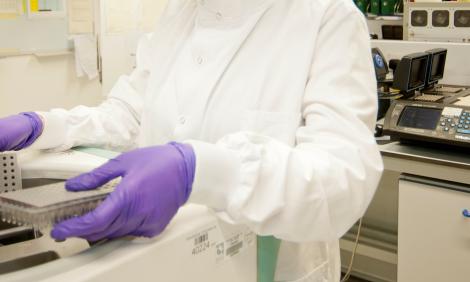Infection sciences
Infection science focuses on such areas as clinical microbiology, immunology, parasitology and virology.
If you work in infection sciences, you’ll study the culture and identification of bacteria, viruses, fungi and parasites that cause infection and disease, including infectious diseases.
Working life
Within a wider public health role, you will also work in the prevention and control of epidemics and your work may involve susceptibility testing of the infectious pathogens to antimicrobial drugs, such as antibiotics, that will guide the treatment of patients.
You’re most likely to be hospital based, and will spend most of your time working in a pathology laboratory, using a broad range of sophisticated, innovative techniques, such as the molecular detection of pathogens.
Who will I work with?
You’ll work as part of a broader team of staff including other healthcare science staff, doctors specialising in areas such as immunology (including biomedical scientists) and infection control nurses.
Want to learn more?
-
Most jobs in the NHS are covered by the Agenda for Change (AfC) pay scales. This pay system covers all staff except doctors, dentists and the most senior managers. If you work in infection sciences, you will typically be in a post between AfC bands 5 and 9, depending on the precise role and level of responsibility. As a healthcare science practitioner, you’d usually start on band 5, with opportunities to progress to more senior positions. Trainee clinical scientists train at band 6 level, and qualified clinical scientists are generally appointed at band 7. With experience and further qualifications, you could apply for posts up to band 9.
NHS staff will usually work a standard 37.5 hours per week. They may work a shift pattern.
Terms and conditions of service can vary for employers outside the NHS.
-
With further training and/or experience, you may be able to develop your career further and apply for vacancies in areas such as further specialisation, management, research, or teaching.
Healthcare science staff often work at the forefront of research and innovation, so that patients are continually receiving the very best healthcare. For example, in infection sciences, healthcare science staff have worked to develop the tests required to detect new respiratory viruses, are involved in the management of healthcare associated infections, design tests to detect and characterise antibiotic resistant bacteria and implement tests to diagnose infectious diseases in the community or at the patient bedside.
-
Job market
In November 2018, there were 6,123 clinical scientists registered with the Health and Care Professions Council.
The NHS Scientist Training Programme (STP) attracts many more applicants than there are places and so there is considerable competition for places.
Finding and applying for jobs
When you’re looking for job vacancies, there are a number of sources you can use, depending on the type of work you’re seeking.
Check vacancies carefully to be sure you can meet the requirements of the person specification before applying and to find out what the application process is. You may need to apply online or send a CV for example.
For the NHS Scientist Training Programme (STP) there is an annual recruitment cycle. Applications usually open in early January for the intake in the following autumn and should be made through the National School of Healthcare Science's website, where you can also find information about the programmes and the recruitment process.
Key sources relevant to vacancies in the health sector:
- Vacancies in organisations delivering NHS healthcare can be found on the NHS Jobs website
- Opportunities in the Civil Service can be found on the Civil Service Jobs website
- Vacancies in local government can be found on the Local Government Jobs website and the Jobs Go Public website
As well as these sources, you may find suitable vacancies in the health sector by contacting local employers directly, searching in local newspapers and by using the Universal Jobmatch tool.
Find out more about applications and interviews.
It can be advantageous to have gained some experience of working in a relevant environment before applying for a place on a course or job vacancy. You should always check with the course provider or the employer to see what sort of experience is preferred or required.
Volunteering is an excellent way of gaining experience (especially if you don’t have enough for a specific paid job you’re interested in) and also seeing whether you’re suited to a particular type of work. It’s also a great way to boost your confidence and you can give something back to the community.
-
For further information about a career in infection sciences, contact:





